We are what we eat.
Even though you might not actually become what you eat, your nutritional decisions definitely have an impact on your general health and productivity levels.
Given that the brain consumes about 20% of the body’s calories, it requires a lot of healthy sustenance to maintain its focus and productivity throughout the day.
Having said that, brain health can be improved or maintained with quality brain food, increasing productivity as a result.
Brain food supports brain health and help the short- and long-term functions of your brain.
The question is: which brain food can help give you the fuel you need? In essence, the best nutrients for the brain include fruits, vegetables, and even chocolate (yes, chocolate!). Everyone can find something they enjoy! But first, let’s talk a little more about brain food.
What is brain food?
Brain food is high in antioxidants, healthy fats, vitamins, and minerals. They give your brain power and vitality and support brain cells, which fend off the emergence of brain diseases.
Brain food also helps support your gut, which produces some important hormones and neurotransmitters. These play a critical role in the cognitive functions of your brain, such as comprehending and processing new information, memory, concentration, and productivity.
This means that giving the brain the kinds of chemical signals that keep us operating at our best requires a healthy gut.
Productivity diet plan by Chanty
Proper sleep and regular exercise are essential for a productive daytime routine, but eating a healthy diet is important as well. By simply being mindful of what you eat, and knowing what slows you down, you can help increase efficiency.
What we eat has a strong impact on our performance!
Here’s an exclusive productivity diet plan by Chanty:
Best brain food to boost work productivity
What nutrients are best for brain power? In order to prevent cognitive decline and boost productivity, here are some of our top picks for your brain power:
Fatty fish
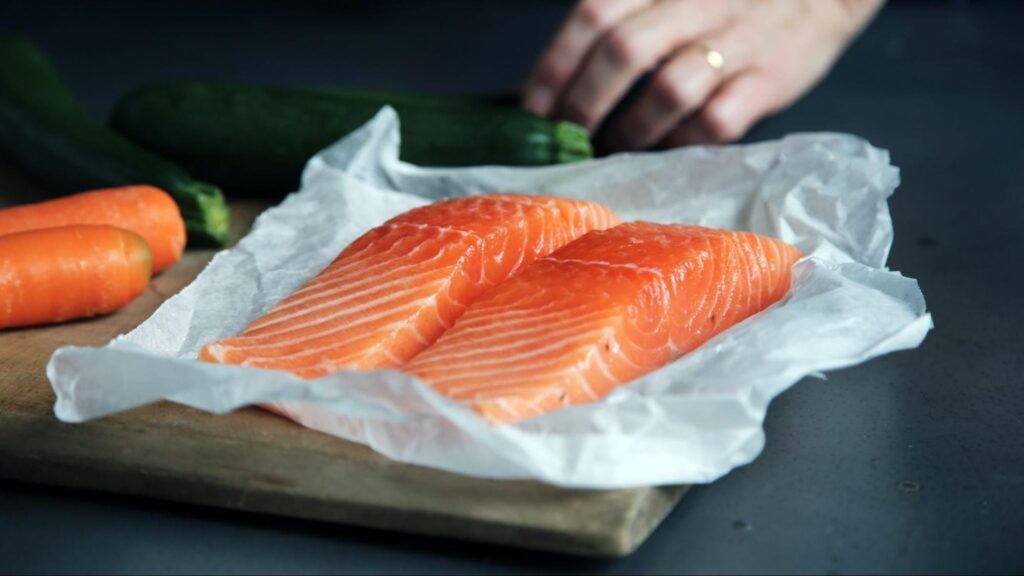
unsplash.com
Fatty fish is usually at the top of the list when it comes to brain food.
Fish like salmon, trout, albacore tuna, herring, and sardines are excellent sources of omega-3 fatty acids.
These fatty acids are necessary for learning and memory because our brain needs them to create brain and nerve cells.
Our brain is made up of about 60% fat, and omega-3 fatty acids make up 50% of that fat.
Regular fish eaters have brains with greater amounts of gray matter. The majority of the nerve cells responsible for decision-making, memory, and feeling are found in the gray matter.
Overall, fatty fish is an excellent source of brain food.
Dark chocolate
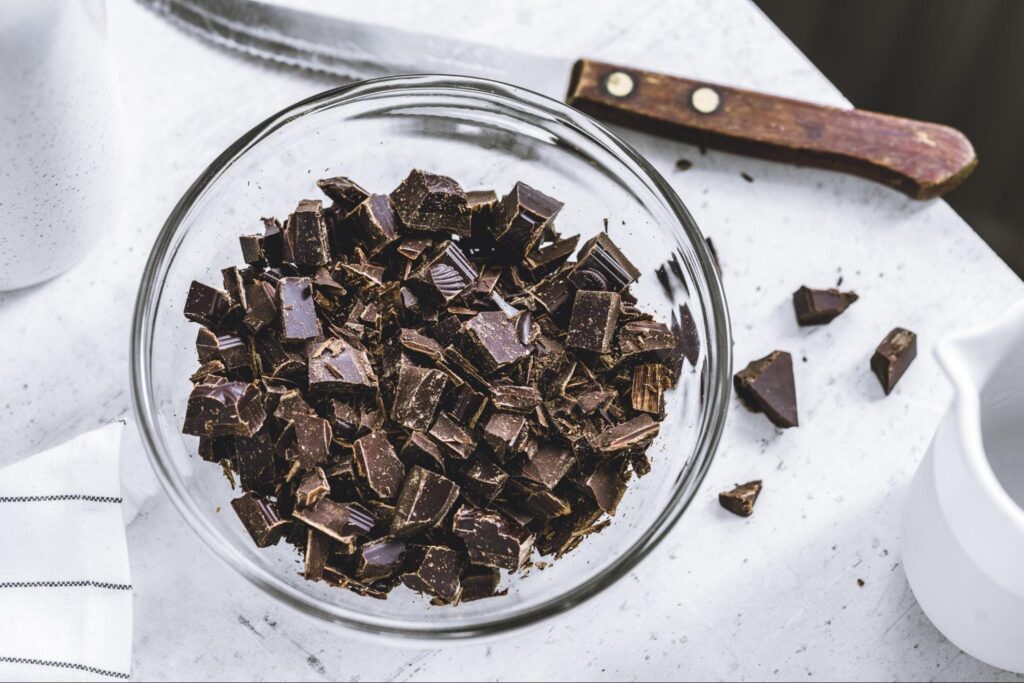
unsplash.com
Cacao, also known as cocoa, is a component of dark chocolate.
Flavonoids are a type of antioxidant found in cacao and the brain appears to benefit from them a lot.
According to a review, they encourage neuron and blood vessel growth in parts of the brain involved in memory and learning. They could increase blood flow to the brain as well.
A study confirms that dark chocolate has positive effects on the brain. After participants consumed chocolate with at least 70% cacao, the researchers used imaging techniques to examine brain activity.
The researchers came to the conclusion that eating this kind of dark chocolate could enhance brain plasticity, which is important for learning, as well as have other positive effects on the brain.
Coffee

nbcnews.com
You’ll be happy to know that coffee is healthy if drinking it helps you get out of bed in the morning.
Caffeine and antioxidants, two of coffee’s main ingredients, can support brain health.
It also helps with a heightened sense of awareness. By blocking the chemical messenger adenosine, which makes you feel sleepy, caffeine keeps your brain alert.
Additionally, some of your “feel-good” neurotransmitters, like dopamine, may be increased by caffeine.
Blueberries + other berries

culinarydietetics.com
Blueberries and other berries (such as strawberries, blackberries, raspberries, etc.) are fruits that experts advise consuming daily, proving that great things can come in small packages.
That’s because they taste like an all-natural candy and have so many wonderful advantages!
Firstly, blueberries are among the food with the highest levels of antioxidants. They also contain fiber, vitamin C, and vitamin K.
Blueberries are particularly effective at preventing brain aging, cognitive decline, and stress due to their high gallic acid content.
Turmeric
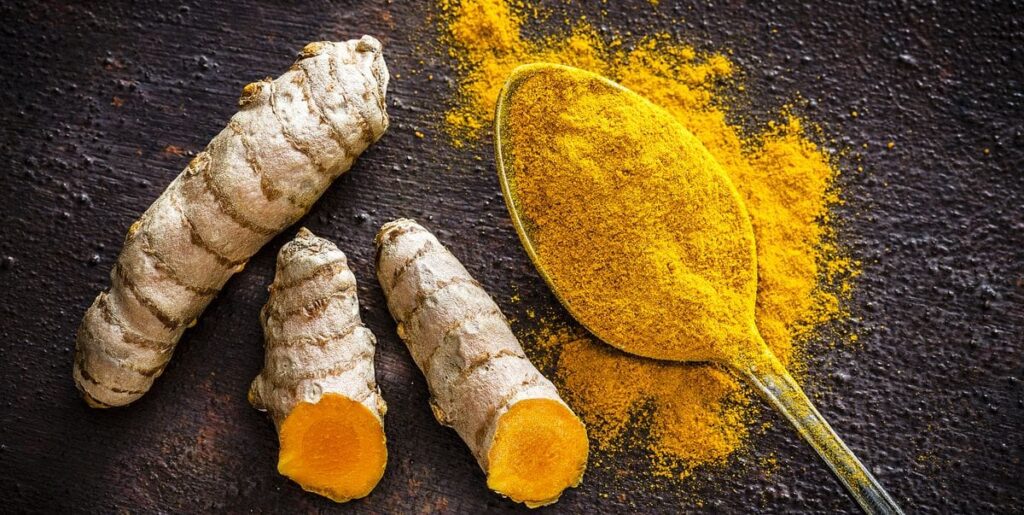
bicycling.com
Recently, there has been a lot of buzz about turmeric.
This dark yellow spice, which is a main component of curry powder, has many advantages for the brain.
The active component of turmeric, curcumin, has been demonstrated to cross the blood-brain barrier, allowing it to enter the brain and benefit its cells directly.
It is a strong anti-inflammatory and antioxidant substance that has been connected to reducing depression. Serotonin and dopamine are increased by curcumin, both of which are mood enhancers.
Curcumin increases brain-derived neurotrophic factor, a kind of growth hormone that promotes the development of brain cells.
The active ingredient in turmeric, curcumin, has potent anti-inflammatory and antioxidant properties that are advantageous to brain health.
Broccoli + other calciferous veggies

eatright.com
When your mother asked you to eat your broccoli, she was right.
In addition to closely related vegetables like cauliflower, kale, and Brussels sprouts, broccoli is one of the best sources of choline and vitamin K, which can help maintain memory function.
In fact, just one cup of it gives you 150 percent of the daily recommended amount of vitamin C.
It also has a variety of phytonutrients that guard brain cells from oxidative stress.
Broccoli also contains a lot of fiber, so you’ll feel full quickly.
Pumpkin seeds
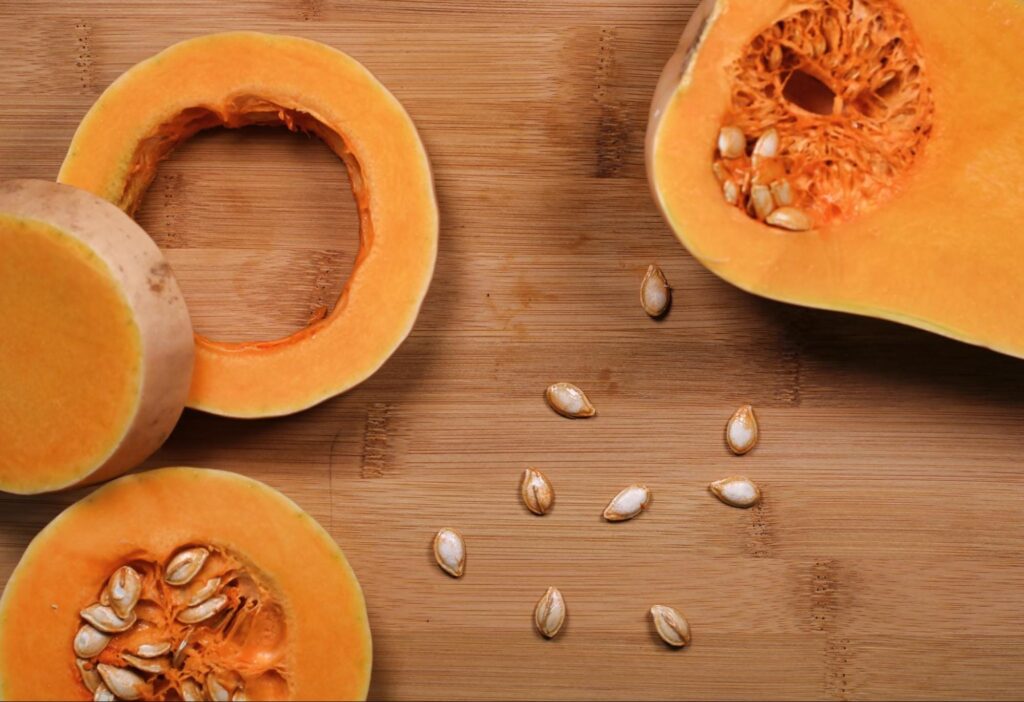
unsplash.com
Strong antioxidants found in pumpkin seeds guard the body and brain against damage from free radicals.
Additionally, they are a great source of magnesium, iron, zinc, and copper.
The following food types are crucial for the health of the brain:
- Zinc plays a key role in nerve signaling. Numerous neurological conditions, such as Alzheimer’s disease, depression, and Parkinson’s disease, have been linked to zinc deficiency.
- Magnesium is necessary for memory and learning. Numerous neurological disorders, such as migraine, depression, and epilepsy, are associated with low magnesium levels.
- Copper is used by your brain to help regulate nerve signals.
- The symptoms of an iron deficiency frequently include brain fog and diminished brain function.
Copper, iron, magnesium, and zinc are just a few of the micronutrients that pumpkin seeds are particularly high in.
Nuts
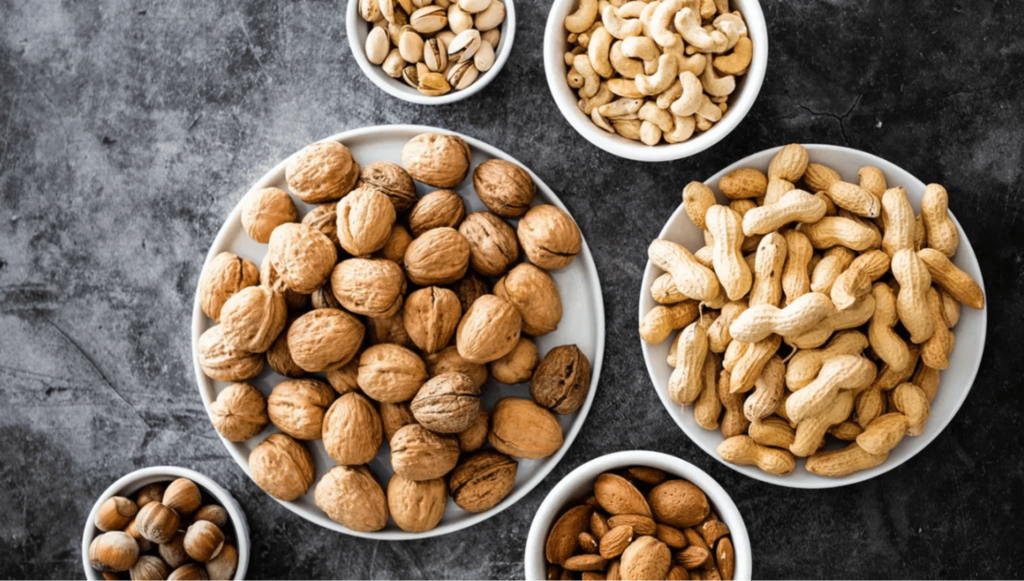
healthline.com
According to research, eating nuts can improve heart health indicators. A healthy heart is associated with a healthy brain.
The benefits of nuts for brain health may be explained by a number of nutrients, including healthy fats, antioxidants, and vitamin E.
To help slow down mental decline, vitamin E shields cells from free-radical damage.
All nuts are beneficial to your brain, but walnuts may have an edge because they also contain anti-inflammatory omega-3 fatty acids.
Vitamin E, good fats, and plant compounds are just a few of the nutrients found in nuts that can help your brain function better.
Oranges
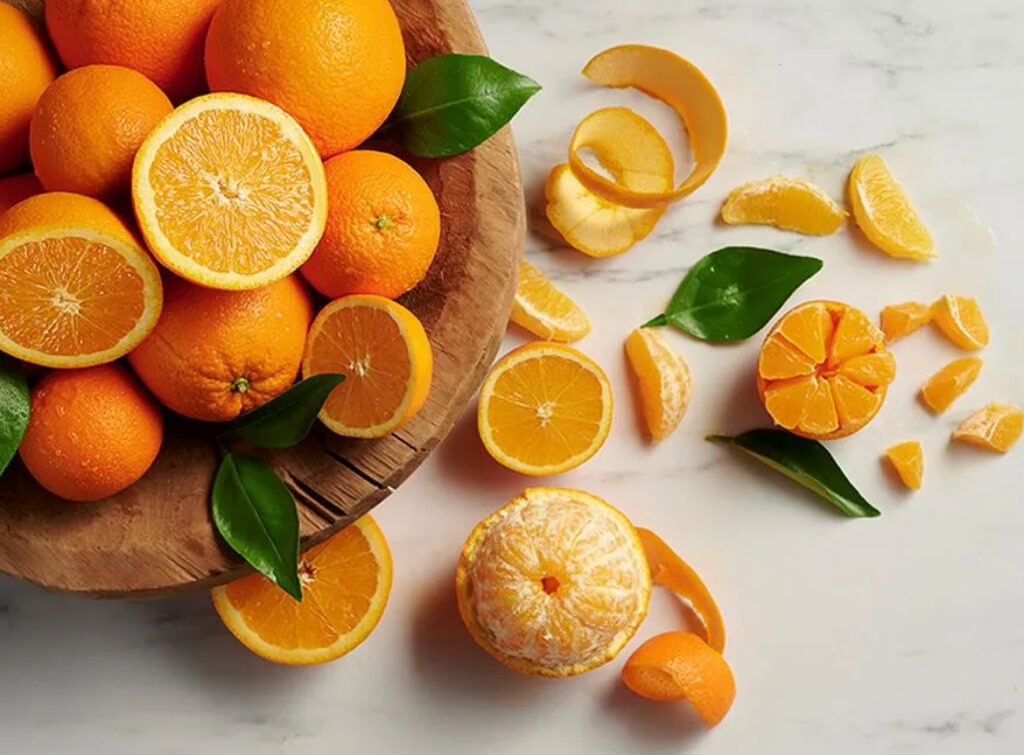
pittmandavis.com
Eating one medium orange will provide you with nearly all the vitamin C you require for the day.
This is crucial for maintaining brain health because vitamin C plays a crucial role in delaying mental decline.
According to one study, higher blood levels of vitamin C were linked to enhancements in focus, memory, attention, and decision-making tasks.
Strong antioxidants like vitamin C aid in the battle against free radicals that can harm brain cells. Plus, vitamin C supports brain health as you age.
Other brain food sources that contain significant amounts of vitamin C include bell peppers, guava, kiwi, tomatoes, and strawberries.
Oranges and other vitamin C-rich foods can help protect your brain from oxidative stress caused by free radicals.
Leafy greens
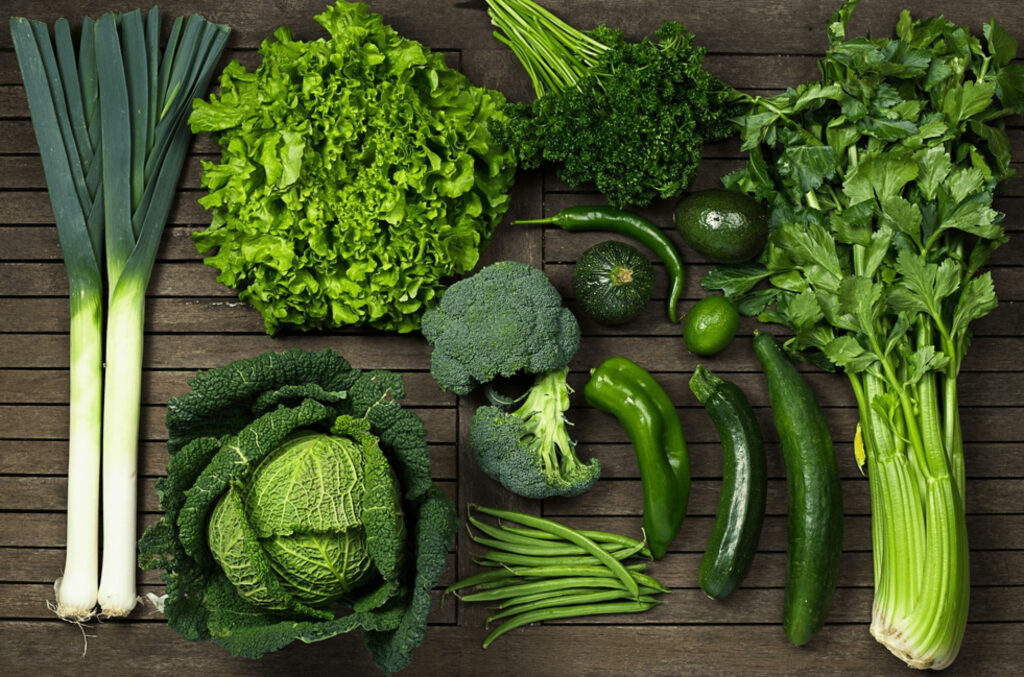
healthwire.com
Leafy greens are rich in nutrients that fend off burnout and cognitive decline, such as vitamin E, carotenoids, and flavonoids.
A further advantage is that they are a fantastic source of folate, a natural form of vitamin B9 that is crucial for the production of red blood cells.
Increasing folate status has positive effects on our cognitive function and is a crucial cofactor in the production of neurotransmitters, whereas folate deficiency may be the cause of some neurological conditions.
Greens like spinach, Swiss chard, and dandelion greens are also high in folate.
What is your favorite brain food?
Numerous brain food can support brain power.
Antioxidants are compounds found in some food, including the fruits and vegetables on this list, tea, and coffee, which help shield your brain from harm.
Others, like nuts and eggs, have nutrients that help with memory and brain growth.
By thoughtfully including these types of brain food in your diet, you can enhance brain power and improve your productivity, alertness, memory, and mood.




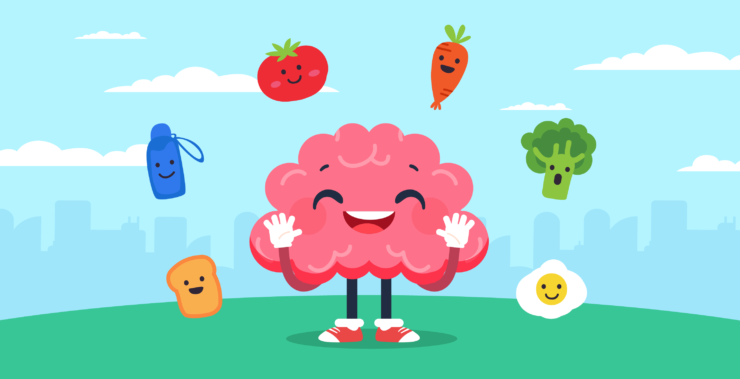




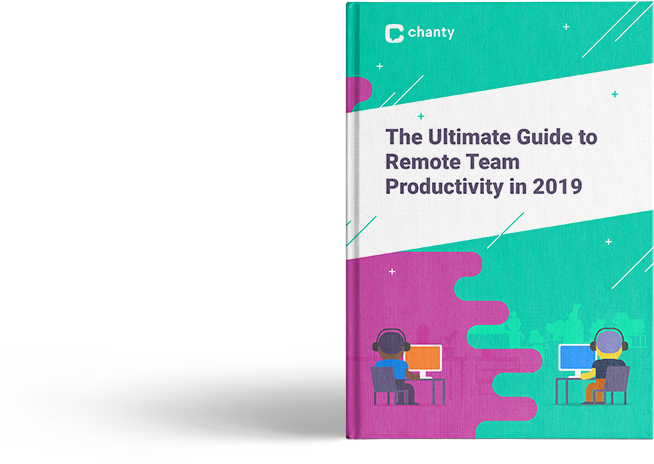


Increasing folate status has positive effects on our cognitive function and is a crucial cofactor in the production of neurotransmitters, whereas folate deficiency may be the cause of some neurological conditions.